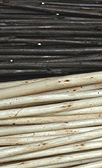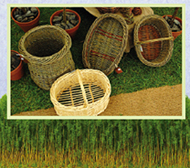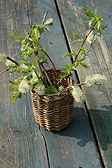Somerset Willow Weaving & Charcoal



Nothing could be more traditional and satisfying for holiday makers to the West Country than to buy a wicker basket in the Somerset Levels to take home. Here is a souvenir which fulfils all of our criteria (perhaps with the exception of price): top quality, strong, light and attractive, a product of its surroundings and providing local employment. Baskets are useful, too. In an ancient landscape of flat land, misty, sodden and gnarled, the willows tame the flood waters of the rivers Yeo, Cary, Tone, Axe and Parrett.
But global warming, together with massive cheap imports from China and Eastern Europe, have cut a swathe through the business. And Somerset’s youth is disinclined to spend long uncomfortable hours either out in the cold and wet or with aching muscles weaving indoors.
Two companies, the Somerset Willow Company of Wire Works Estate, Bridgwater and Coates Willow Company, Stoke St Gregory, have gone in different directions and are managing to survive. Darren Hill of the Somerset Willow Company is a third generation basket maker. His father and grandfather wove the sort of willow goods that have been totally replaced by plastic – pigeon baskets (for racing pigeons to travel by rail), cat baskets, fishing and picnic baskets. Fifteen years ago the Hills sold picnic baskets in John Lewis for £120-£200 but then Argos started selling them, fully kitted out and made in China, for £20 each.
Darren Hill says that growing willow is in decline. No misty eyed nostalgic, he has travelled widely to check out the competition. Our main European competitors are Poland and the Czech republic, although our willow, salis triandra, is superior in strength and suppleness. Recently the Somerset Willow Company bought its own willow bed, 19 acres of willow planted, as Darren Hill puts it, “in rows like cabbages”. He says it provides brilliant cover for wildlife – the willows grow 7-8 feet tall and deer hide within. He says that if he hadn’t bought the land it would have been ripped out and grassed. At the height of the industry, during the Second World War, there were 2,000 acres of willow, now there are 100.
Climate change has had an effect on the application of chemicals over the last 5-10 years. Aphids breed during warm humid springs and damage the willow rods. Gnawed buds cause kinks in what should be straight rods. Once, a soap wash once a year was enough. Now the willows are sprayed with a pesticide every week for ten to 12 weeks every year. Also, flooding has caused major problems as willow can’t be cut when it is submerged. There is a higher water table and more flooding will further damage the industry.
Meanwhile the Somerset Willow Company has adapted mainly because of the Hill family’s open-minded approach. Thirty years ago they were asked by a man if they could make baskets for hot air balloons. The Hills rose to the challenge and the popularity of hot air ballooning has provided continuous demand. But their current best-seller is even more striking – willow coffins.
Coates Willow Company is reached by car down wiggly little roads set with hump backed bridges; Meare Green Court contains workshops, a café, a shop and a charming museum full of the golden age of willow ware. Coates own 80 acres of land planted with willows, of which most of the beds are on West Sedgemoor but there are also 17 acres on Hay Moor adjacent to their site. Apart from woven goods, they make charcoal which uses 20 acres – it is an intensive plantation producing 40 million rods a year of best quality willow. Coates went into producing artists’ charcoal in the late 1980s and this now makes up two thirds of the business, supplying 38 countries world wide and to companies such as Windser & Newton, Rowney, Arnolds, Reeves, Castells in Germany and Koh I Noor. Competition comes from Finland but Ann Coates claims that Finnish spruce is less effective than their one year old willow rods which give a denser, blacker and softer result. Apart from the charcoal itself, Coates make all the boxes and packaging (plus barcoding) for their customers. A box of 30 short sticks of artists’ charcoal costs £1.75p from Coates. This is a souvenir which embodies the constant enterprise needed to keep alive this family-run rural business from its founding in 1819 to the present day.
Chemicals are sprayed to prevent rust fungus as well as canker which can cause spots and bindweed which chokes the rods. They, too, spray against aphids which, if they eat terminal buds, will cause the rods to bush rather than grow long and straight, “A hundred years ago all the weeding was done by hand but we have very low margins and we pride ourselves that our product is a heritage to the county.”
Coates employs around 40 people, also producing 80 different styles of basket which should each last for 30 years. As Anne Coates says, “Think of having a wicker shopping basket for life – costing £20 - rather than an endless series of plastic carrier bags – and Coates can repair them”.
But what of possible ecological damage caused by the chemical spraying of the willows grown by both the Somerset Willow Company and Coates? Richard Archer of the Somerset Royal Society for the Protection of Birds says that willow growing is yet another form of intensive agriculture but so far they have not been “sufficiently concerned” to raise the issue.
It is the willow growers who have complained to the RSPB about their conservation officers not evacuating the water from RSPB land quickly enough. For the RSPB the Somerset Levels is a highly sensitive and complicated area where a balance has to be kept between allowing flooding each year for a certain time for the benefit of wading birds but not too long to cause waterlogging and damage to the soil. Archer says that 60% of the land is in poor condition and many farmers have given up managing their fields. “We haven’t looked at the willow weaving industry because we have too many other major problems”.
Leana Pooley for Common Ground, 2007
Contact:
Somerset Willow Company
The Wireworks Estate,
Bristol Road,
Bridgwater,
Somerset TA6 4AP
+44 (0) 1278 424003
<www.somersetwillow.com>
Coates
Meare Green Court, Stoke St Gregory, Taunton, Somerset, England, TA3 6HY
+44 (0) 1823 490249
<www.englishwillowbaskets.co.uk>